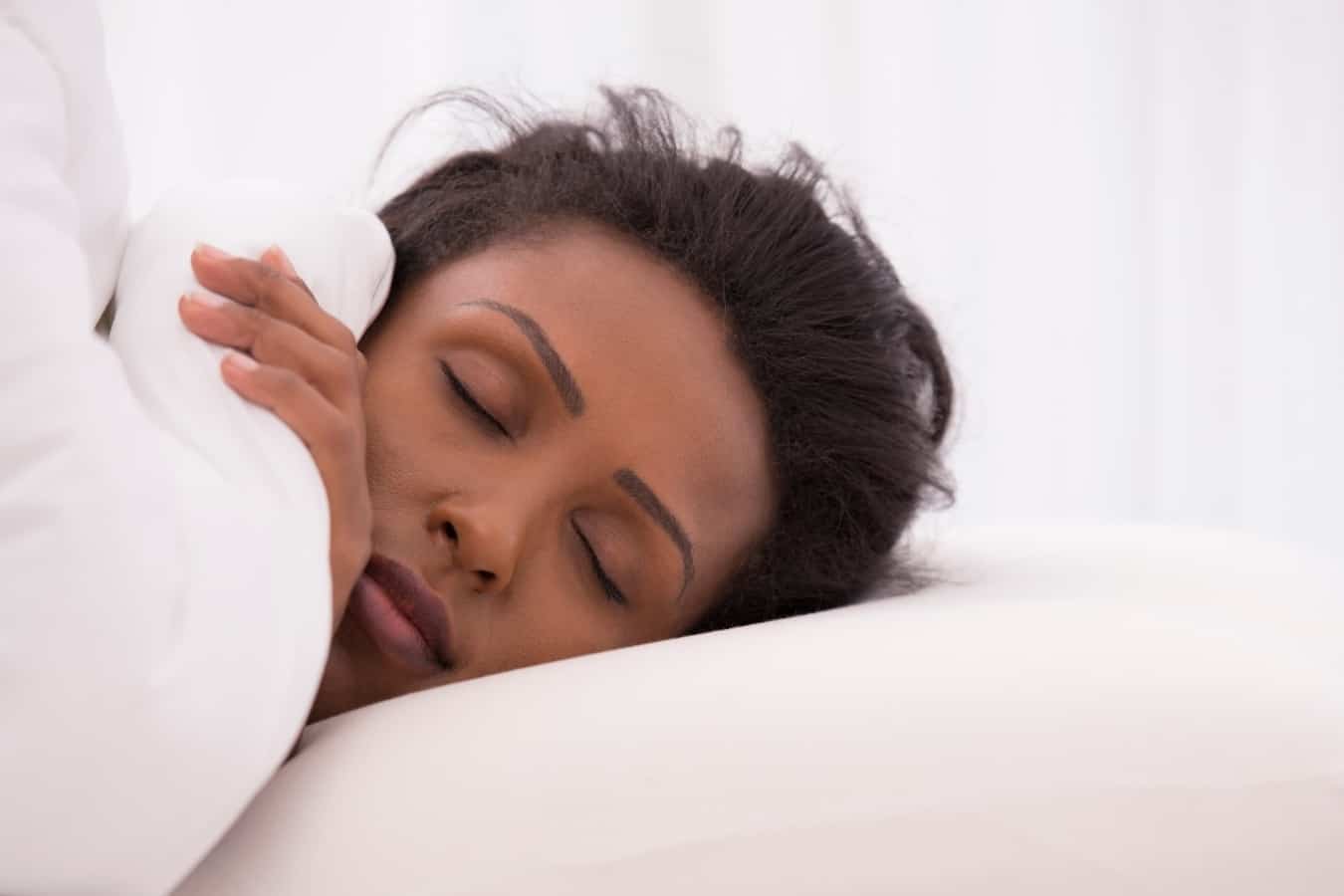Do you ever wonder if you can sleep with product in your hair? Hair products can help improve the health and condition of your hair, but is too much of a good thing actually bad? We reveal all in this article.

The Quick answer To ‘Can I Sleep with Product in My Hair’?
It is possible to sleep with products in your hair, however, it depends on a few factors such as the sensitivity of your skin and scalp, the condition of your hair, and of course, the specific product.
To help you determine if sleeping with a product in your hair is a good option that can enhance your hair care routine, let’s take a closer look at each of those factors.
What Kind of Hair Products Can Be Left In Your Hair Overnight?

There are many different overnight hair products available. These range from conditioners, masks, oils, and other treatments.
Although you might think that they all are used for the same reasons, there are important differences, and they should not be used interchangeably.
Let’s take a closer look.
Deep Conditioners
Not to be confused with daily conditioners that should be rinsed out in just a few minutes, deep conditioners are intended to be left in for considerably longer, up to 30 minutes.
Reasons to not leave deep conditioners in hair overnight
- Most conditioners contain chemicals that, if left on too long, can be absorbed into the bloodstream through the scalp. Not only can this damage your hair roots, but it can also be bad for your overall health.
- Leaving conditioner in too long can also cause your hair to absorb too much moisture. While you might think that is what you want it to do, it actually is extremely damaging to your hair, due to a process known as hygral fatigue.
What is Hygral Fatigue?
Simply put, hygral fatigue is the result of over-moisturization of the hair.
When hair absorbs moisture, it expands and swells to accommodate the increased liquid volume within the shaft.
As the hair dries, it contracts. The more frequently this happens or the more excessive moisture the hair absorbs, the weaker and less elastic the hair strands become. This leads to brittle hair that breaks easily.
Signs of hygral fatigue include:
- Wet hair that has a sticky or gummy feeling when you pull it
- Wet hair that is unusually elastic, meaning it stretches unnaturally long before it breaks
- Curly hair that is weak, poorly defined, or that is flat and limp
- Wispy hair that feels abnormally light
- Excessive breakage
Hair Masks
Thicker than conditioners, hair masks are often primarily made from natural ingredients such as avocado oils, argan oil, coconut oil, or shea butter.
While both conditioners and masks provide generally-similar benefits, a hair mask offers more intense healing and hydration.
Think of a hair mask as a facial for your hair.
Daily conditioners are fine for maintenance and keeping your hair manageable, but a mask is better for hair that is frizzy, damaged, or dry.
Reasons to not leave deep conditioners in hair overnight
- Leaving a hair mask on overnight will not give you more benefits
- Hair masks will make your hair feel wet which again, can cause hygral fatigue.
- If you have high porosity hair, your hair is more susceptible to moisture. Products can pass through the protective cuticle layer and penetrate hair follicles. This can cause over-moisturization.
Of special relevance, while the porosity level of your hair is primarily determined by genetics, is also affected by other outside factors.
These include your use of hair dyes and heat treatments, or how often you swim in a chlorinated pool.
How To Check The Porosity Of Your Hair:
- First, place a clean and product-free strand of your hair into a glass of water.
- Second, let it sit in the glass and observe what happens.
- Third, if your hair immediately sinks to the bottom, that is a sign that your hair is probably porous. The faster the strand of hair absorbs water, the faster it will sink.
- Medium/normal porosity hair will sink far more slowly, and will even float around the middle of the glass for a while before finally sinking all the way to the bottom.
- Hair that isn’t porous will float on top of the water surface for a long time, and may in fact never sink.
Hair Oils
Hair oils protect strands from excessive water absorption and prevent harmful chemicals from damaging hair follicles.
Individual natural oils provide specific benefits.
- Coconut oil – reduces protein loss
- Argan oil – softens hair and reduces frizziness
- Avocado oil – high in vitamin E, encourages hair growth and slows hair loss
- Other oils (olive, grapeseed, jojoba, etc.) – prevent dryness and damage and promote elasticity
A very small amount of oil applied to the ends and middle of long or naturally curly hair before bedtime helps moisturize the strands, prevent split ends, and reduce breakage.
There is no need to add oil to the roots because protective sebum is naturally produced from the scalp.
Reasons to not leave oil in hair overnight
- Leaving hair oil in too long or using too much can make your hair greasy. Because everyone’s hair type, length, style, and porosity is different, the learning curve of finding the right amount can be steep.
- 3Of all the various types of hair products, oils are the most likely to trigger an allergic reaction or irritate sensitive skin, especially if left on too long.
- Excessive oil on the scalp can clog pores and interfere with new hair growth.
- Heavy oils or excessive application can cause a protein buildup and exacerbate problems of stiffness and unmanageability. It can also leave behind a residue that noticeably attracts dust and dirt.
What About Leave-in Hair Conditioners and Overnight Care Serums?
There are a few big differences between leave-in hair conditioners, overnight hair serums, and the other products discussed:
- These are products that are specifically designed to be left in for several hours. This means they are formulated to be as gentle as possible.
- They are intended to be applied lightly, so there is very little risk of residue, over-moisturization, or skin problems.
- Overnight serums and conditioners are recommended as an occasional addition to your hair care regimen, not as a part of your normal routine.
The Bottom Line About Sleeping with Hair Products

There is no one-size-fits-all answer to the question of whether you can sleep with hair products.
For most everyday products, it is not recommended.
For others, it requires you to do a little homework to find out which specific products are best for your hair and skin type and that address your specific beauty needs.
But now that you have a general framework as to the pros and cons of each type of product, you can make a better-educated decision about your hair care routine.
How Do I Prevent Acne Breakouts from My Hair Products?
Always check the ingredients before putting any product in your hair, especially a product that you plan on leaving in for an extended period.
Not every product that is made for your hair is necessarily gentle on your skin.
For example, many shampoos and conditioners contain propylene glycol, which can irritate your skin, resulting in dryness or even dandruff.
Propylene glycol often remains on the skin even after you rinse it and will dissolve your skin’s natural oils.
Other products can promote acne and other skin problems. If you are prone to breakouts, some of the hair products to be avoided are those that contain shea butter, jojoba oil, mineral oil, petroleum, silicone, or isopropyl myristate.
In fact, if you have acne, leaving in any oil can make your skin problems worse.
What is the Biggest Piece of Advice About Sleeping in Hair Care Products?
The #1 most-repeated advice from hair care experts is to NEVER go to bed with wet hair.
When hair is wet, it is at its most vulnerable – it can absorb excess moisture and it is most prone to breakage.
If you wash your hair before bed, always dry it thoroughly with a towel, and if possible, put it up before you go to bed.
Disclaimer: This site is not intended to provide professional or medical advice. All of the content on LovedByCurls.com is for informational purposes only. All advice should be followed at your own discretion. Ingredients may change at any time so always check the product label before using. Check our full disclaimer policy here.
